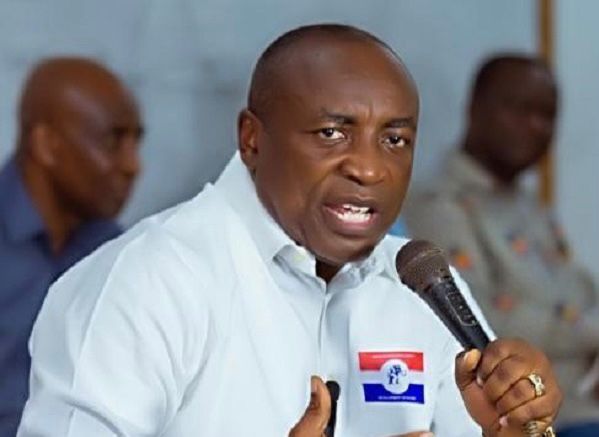Kwabena Agyei Agyepong, a prominent figure within the New Patriotic Party (NPP) and a contender for its flagbearer position, has voiced profound concerns regarding the current state of Ghana, emphasizing the urgent necessity for transformative leadership to steer the nation towards prosperity. Filing his nomination forms on August 26th, 2023, for the party’s presidential primaries slated for January 2026, Agyepong characterized Ghana as being at a critical juncture, demanding a fresh approach to governance to address long-standing issues of mismanagement and neglect, particularly in the crucial areas of land ownership and natural resource management. He articulated his vision for a “new dawn,” an era marked by a revitalized focus on wealth creation and equitable distribution of resources.
Central to Agyepong’s platform is the empowerment of citizens through leveraging their property, especially land, as a catalyst for economic advancement. He envisions a Ghana where land ownership translates into tangible wealth creation, enabling access to quality education, healthcare, and a broader range of opportunities. His concern stems from the historical injustices surrounding land ownership, where communities have been displaced without adequate compensation, and the detrimental impact of mining operations on the environment and livelihoods. He decries the destruction of farmlands, pollution of water bodies, and the erosion of opportunities for young people, consequences he attributes to unsustainable resource management practices. This focus on land rights and equitable resource distribution forms the cornerstone of his campaign message.
Agyepong’s campaign has adopted a conciliatory tone, extending apologies to communities and individuals who have suffered from land dispossession and environmental degradation. This apology, he emphasizes, is not merely a symbolic gesture but a commitment to rectify past injustices and build a future where the rights of all citizens are respected and protected. His campaign promises a comprehensive redress of grievances, signaling a departure from what he perceives as a history of neglect and disregard for the plight of affected communities. This commitment to restorative justice resonates with a growing demand for accountability and equitable resource management in Ghana.
The core of Agyepong’s proposed solution lies in the “National Property Justice Initiative,” a comprehensive program designed to overhaul land tenure laws and ensure fair compensation for property owners. The initiative comprises four key commitments: a thorough review and reform of existing land tenure laws with a focus on safeguarding customary land rights, the establishment of transparent and equitable compensation frameworks for property owners affected by development projects, the creation of youth-led oversight councils in mining districts to empower local communities and ensure responsible resource management, and the implementation of widespread civic education campaigns to promote awareness of land rights and environmental stewardship. These commitments represent a comprehensive approach to addressing the complex issues surrounding land ownership and resource governance.
Agyepong believes that empowering local communities, particularly the youth, is crucial for ensuring sustainable and equitable development. By giving young people a voice in the management of resources within their districts, he aims to foster a sense of ownership and responsibility, ultimately leading to more sustainable practices and a greater share of benefits for local communities. This emphasis on youth involvement reflects a broader trend in recognizing the importance of intergenerational equity in resource management. Furthermore, the focus on civic education underscores the crucial role of informed citizenry in demanding accountability and advocating for their rights.
Agyepong joins a competitive field of NPP stalwarts vying for the party’s nomination, including figures like Kennedy Agyapong, Bryan Acheampong, Dr. Yaw Osei Adutwum, and Vice President Dr. Mahamudu Bawumia. This crowded field signifies the high stakes involved in leading the NPP into the 2028 general elections. Agyepong’s distinct focus on land rights, resource governance, and restorative justice offers a unique perspective within this competitive landscape, potentially resonating with voters seeking a candidate committed to addressing historical injustices and promoting equitable development. His campaign will likely hinge on his ability to effectively communicate this message and differentiate himself from the other contenders in the race.














